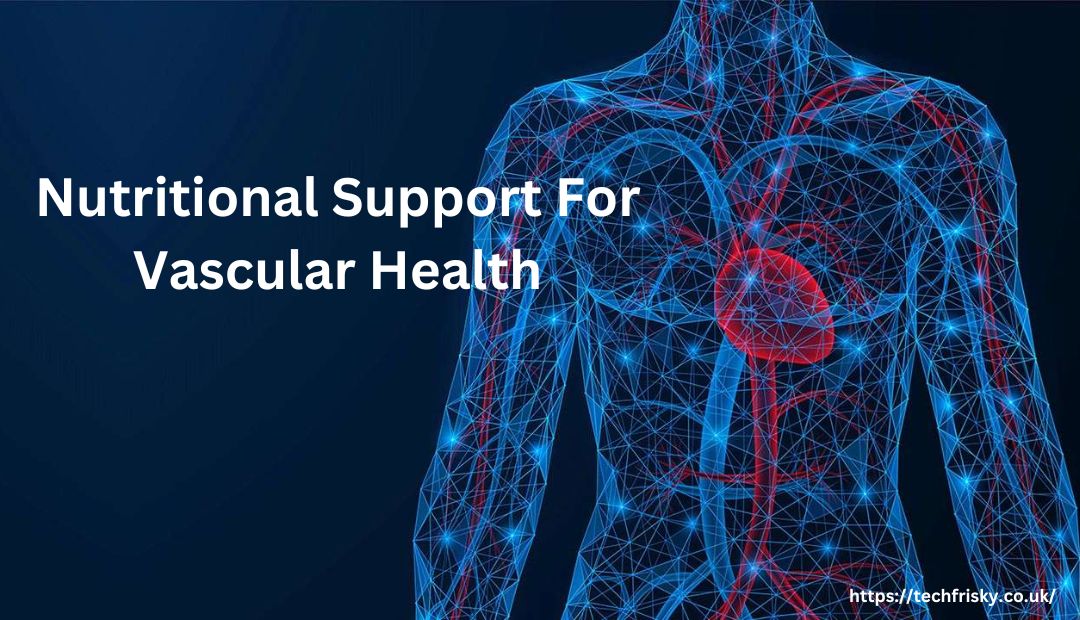Vascular health is crucial for maintaining proper circulation, and when it falters, issues like varicose veins can arise. While genetics and lifestyle play a role, nutrition is a powerful yet often overlooked factor in promoting healthy veins. The right foods can improve circulation and strengthen blood vessels, helping to prevent varicose veins. In this article, we explore how specific nutrients and dietary choices support vascular health and reduce the risk of developing varicose veins.

The connection between diet and vascular health
The saying “you are what you eat” holds especially true when it comes to your veins. The health of your vascular system is intricately tied to the nutrients you consume daily. Just as poor dietary choices can lead to high blood pressure, inflammation, and weight gain—all of which put strain on your veins—nutrient-rich foods can strengthen blood vessels, enhance circulation, and prevent issues like varicose veins.
A balanced diet rich in vitamins, antioxidants, and essential fatty acids helps to keep your veins supple and resilient, reducing the risk of damage. These nutrients play a crucial role in supporting vein walls, ensuring smooth blood flow, and preventing the pooling that can lead to varicose veins. For a more detailed understanding of the causes and prevention of varicose veins, Dr. Ahmed Farah offers expert insights that highlight the importance of diet in maintaining vein health.
For those seeking expert guidance on vein health, consulting with a specialist like Dr. Farah can provide invaluable insights. By visiting his website, you can access tailored advice and explore advanced treatment options designed to address your specific vascular concerns. Dr. Farah’s expertise in diagnosing and treating varicose veins ensures you receive comprehensive care and the support needed to improve your vein health effectively.
Key nutrients that promote circulation
Certain nutrients play a vital role in maintaining healthy circulation and preventing varicose veins. Here are the key players:
- Antioxidants: These protect veins from oxidative stress, helping to keep vein walls strong, flexible, and resilient against damage.
- Omega-3 fatty acids: Known for reducing inflammation, these help promote smooth blood flow and lower pressure in the veins, supporting overall vascular health.
- Fiber: This essential nutrient aids digestion, which reduces strain on the veins and prevents excessive pressure from building up in the lower body.
- Vitamin C: Vital for collagen production, this nutrient helps maintain the elasticity and strength of veins, keeping them more resistant to stress.
- Flavonoids: These compounds strengthen blood vessels and enhance circulation, helping the veins function more efficiently and reducing the risk of pooling blood.
Foods to include for vein health
- Leafy greens and vegetables: Spinach, kale, and broccoli are packed with vitamins, antioxidants, and fiber, all of which support vein strength and flexibility.
- Fish and nuts: Fatty fish like salmon and nuts are rich in omega-3 fatty acids, which help reduce inflammation and improve blood flow.
- Berries and citrus fruits: Berries (such as blueberries and strawberries) and citrus fruits (like oranges and lemons) are loaded with antioxidants and vitamin C, both essential for maintaining healthy, elastic veins.
- Whole grains: Foods like oats, brown rice, and whole wheat bread are excellent sources of fiber, which promotes digestive health and reduces pressure on veins.
By incorporating these nutrient-dense foods into your meals, you can actively support your circulatory system and reduce the risk of varicose veins.
Foods to avoid for healthy veins
While some foods nurture your veins, others can do more harm than good, undermining circulation and putting your vascular health at risk. To keep your veins in peak condition, it’s wise to steer clear of the following:
- Salt-laden snacks: Processed foods and salty treats may taste good, but the high sodium content can cause fluid retention, placing extra pressure on your veins and leading to poor circulation.
- Sugar overload: Sweet indulgences like cakes, candies, and sodas not only add to your waistline but also trigger inflammation, making veins work harder to pump blood effectively.
- Trans fat trouble: Found in fried and heavily processed foods, trans fats clog arteries and hinder circulation, making veins more prone to damage and weakening their ability to function.
- Alcohol excess: Enjoy in moderation—alcohol can cause your veins to dilate and lose elasticity, raising blood pressure and increasing the risk of varicose veins.
By cutting back on these dietary culprits, you can give your veins the support they need to stay strong, flexible, and free from unnecessary strain.
How can small dietary changes improve vein health?
Supporting vein health doesn’t have to be overwhelming. By starting with small, consistent changes to your diet, you can make a meaningful impact on your circulation and lower the risk of varicose veins over time. Simple steps, such as adding antioxidant-rich fruits like berries to your breakfast or incorporating leafy greens into your meals, can significantly boost vein strength.
In addition, prioritizing omega-3-rich foods like salmon, walnuts, and flaxseeds helps to improve circulation and reduce inflammation—both key factors in maintaining healthy veins. Staying well-hydrated and cutting back on high-sodium and processed foods further supports vein health by reducing water retention and bloating.
These small adjustments, practiced consistently, can lead to long-term benefits for your veins and overall vascular health.
